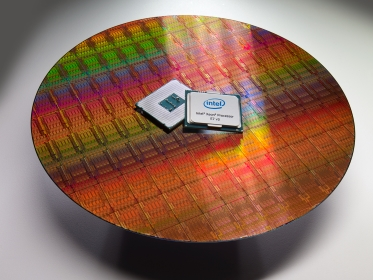
Intel Says Upgraded Haswells Will Speed Analytics

The new Xeon processors unveiled today by Intel will find their way into a number of applications. But one of the most prominent uses will be powering the next-generation of real-time analytics, the chip giant says. Encryption in Hadoop will also get a boost.
Intel processors already run the lion’s share of big data workloads, thanks to the twin forces of open source development and commodity pricing. But with data analytics clearly on the executive agenda in companies across all industries, and IBM touting its Power8 chip as “built for big data,” Gordon Moore’s company clearly feels a need to differentiate itself from its competition and extend its lead in the big data space.
The chipmaker claims to have done that with the new Xeon E7 V3 family of “Haswell” processors unveiled today. The 22nm chips, which boast up to 18 cores per socket (20 percent more than second-gen Haswells), eight to 36 threads per core, and are outfitted with up to 45 MB of last-level cache, which Intel says deliver up to 70 percent more decision support analytic sessions per hour (based on the SAS New Mixed Analytics workload) compared to the previous generation.
“The Intel Xeon processor E7 V3 family is the engine for accelerating business intelligence through real-time analytics,” says Diane Bryant, senior vice president and general manager of the Data Center Group at Intel, “enabling businesses to improve customer satisfaction through more personalized products and services, generate new revenue streams and enhance operational efficiency.”
Intel is clearly focused on in-memory workloads (both analytical and transactional) with the new chip. The company claims that the E7 V3 family can support up to 1.5 TB of memory per socket, which it says is 50 percent more than other architectures can support.
“The need to rapidly extract actionable insight from large volumes of data is driving demand for new technologies for in-memory computing and big data analytics,” Intel says, citing a statistic from Gartner that found in-memory computing will carry $9.5 billion in yearly revenue by the end of 2018. More than 50 percent of large organizations will have adopted in-memory computing by then, Gartner says.
Intel has lined up the usual OEMs to build its new chips into servers–a list that omits IBM, of course, since Big Blue sold its X86 business to Lenovo last year. Intel says plain vanilla eight-socket systems are capable of supporting up to 12 TB of DDR3 or DDR4 memory technology, while bigger clusters composed of up to 32 sockets can be supported with a special node controller.
Of course, Hadoop clusters can get much, much larger than that, and Intel has a line into this line of work with its close business partner Cloudera. To that end, the two companies today announced that Hadoop clusters running Cloudera’s Distribution of Hadoop (CDH) can now take advantage of new cryptographic functions built into the E7 V3 family.
According to Cloudera, its customers will be able to take advantage of the Intel Advanced Encryption Standard New Instructions (Intel AES-NI) instruction set that Intel has built into the new chip. Benchmarks show that using the AES-NI instruction set in CDH enables a customer to encrypt their data with only a 1 to 4 percent performance hit, which is a 2.5x improvement over previous encryption off-load rates, the companies say.
“As a result,” Cloudera says in its press release, “full database encryption is now possible with minimal impact to system performance so that processing resources can run Hadoop jobs at a faster rate, and perform additional Hadoop jobs to accelerate business insights.”
The companies also touted some of their top joint customers since Intel got out of the Hadoop business and invested $740 million into Cloudera last year. New customers include:
- Caesars Entertainment, which is using CDH running on Xeon E5 chips to analyze unstructured and semi-structured data;
- Cerner Corp.; which is a Cloudera- and Xeon-powered data hub that can help predict potential health risks of patients by bringing together disparate data;
- eHarmony; which is delivering personalized recommendations for its online dating site in part with CDH running on a Xeon cluster;
- MasterCard, which was Cloudera’s first customer and is integrating Hadoop-resident data with other data sources.
Related Items:
Intel Exits Hadoop Market, Throws In with Cloudera
Intel Hitches Xeon to Hadoop Wagon































